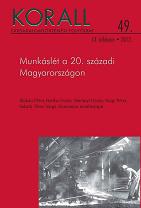„Ezen a szállón szinte minden megszűnt, ami korábban valamifajta többletként volt jelen”. Munkásszállók, szociális jogok és legitimáció a jóléti dikta
“This Workers’ Hostel Lost Almost Every Bit of Added Value it had”. Workers’ Hostels, Social Rights, and Legitimisation in Welfare Dictatorships
Author(s): Eszter BarthaSubject(s): History
Published by: KORALL Társadalomtörténeti Egyesület
Summary/Abstract: The study presents everyday life in East German and Hungarian workers’ hostels in the age of Socialism and aims to contextualise this micro-historical examination in the wider socio-political context of the work politics of the two countries. Because the bitter experience of forced modernisation in both countries resulted in bringing improving living standards and consumer politics to the forefront, these regimes are referred to as ‘welfare dictatorships’ in this paper. Although in the short term the paternalistic state was popular, in the long term it became obvious that the Socialist industry could not come near the consumer standards of developed capitalist countries, in fact, it cannot even maintain the steady development of standards achieved in the 1970s. Workers’ hostels reflected the two faces of the paternalistic state precisely. On one hand the state attempted to provide shelter for everyone, on the other hand, for a significant portion of workers, this shelter was provided in the form of workers’ hostels, which lacked minimal comforts. The latter was also noted by lower-level party officials during the period of the regime’s disintegration. Their reports began to contain increasingly sharp criticism, which not only shows the regime’s legitimisation crisis, but also that the loss of its social support.
Journal: Korall - Társadalomtörténeti folyóirat
- Issue Year: 2012
- Issue No: 49
- Page Range: 58-81
- Page Count: 24
- Language: Hungarian

